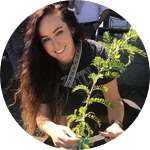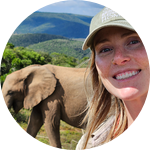About This Project
This study investigates the effects of habitat expansion via fence removal on elephant well-being, movement, behavior, and physiology through the GPS tracking, behavioral observations, dung sampling, herd associations, and individual identification. Our research contributes valuable insight into the benefits of expansion on elephant welfare - informing conservation efforts and management practices aimed at promoting elephant wellbeing.
Ask the Scientists
Join The DiscussionWhat is the context of this research?
The context of this project centers on the critical need to address the wellbeing of African elephants within fenced reserves, focusing on the impacts of habitat expansion. Conducted at Kariega Game Reserve in South Africa’s Eastern Cape, this research assesses how removing interior fences affects elephant behavior, movement, and health. African elephants, vital for biodiversity and ecosystem health, face threats from habitat loss and poaching. Fenced reserves protect wildlife but restrict elephant movements, causing ecological, ethical and social challenges. By using GPS collars and collecting behavioral and physiological data, the project aims to demonstrate the benefits of habitat connectivity for elephants and inform better conservation strategies.
What is the significance of this project?
The significance of this project lies in its potential to transform conservation strategies for African elephants and other wildlife in fenced reserves. African elephants are keystone species and crucial to Africa’s cultural heritage and ecosystem health. The significance extends beyond individual elephants to broader conservation efforts. Understanding the benefits of habitat expansion and connectivity can inform strategies for other fenced reserves and conservation areas facing similar challenges. As climate change and habitat fragmentation continue to threaten wildlife populations globally, promoting natural behaviors and reducing stress through habitat expansion becomes increasingly important.
What are the goals of the project?
The primary goals of this project are to scientifically assess the impacts of habitat and range expansion on the wellbeing of African elephants and to provide critical data to inform conservation strategies.
These goals are achieved through a comprehensive approach that includes spatial, behavioral, and physiological monitoring. The specific objectives of the project are as follows:
1. Assess Movement Patterns and Spatio-Temporal Distributions
2. Evaluate Changes in Home Range Size and Seasonal Patterns
3. Analyze Baseline Behavior and Stress Levels
4. Analyze Activity Budgets (time spent in certain activities)
5. Inform Conservation Strategies
6. Incorporate Elephant Wellbeing into Management Decisions
7. Increase Support for Habitat Expansion
Budget
Our research aims to study the positive impacts of habitat expansion on elephant wellbeing. This includes tracking elephant movements, analyzing health, and observing behavior. We need your support to cover essential expenses. Here’s how your contributions will be used:
Researcher Travel: air travel for our head researcher. Travel is crucial for observing elephants in their natural environment and collecting data firsthand.
Elephant Collar Maintenance: are necessary to monitor elephant movements and habitat use and we will need funds to remove the collars after the research is completed. This allows us to gather precise data on how habitat expansion affects their range and behavior.
Dung Sampling: provides valuable information about the elephants’ stress levels. This budget includes lab fees and supplies such as gloves, sample containers etc.
Gas: is needed for vehicles used in the field to track elephants and transport samples.
Endorsed by
 Project Timeline
Project Timeline
Until January 2025, the project will focus on data collection and analysis, monitoring movement, behavior, and physiological responses to expansion. Until July 2025 involves releasing our research findings and recommendations to the South African government, stakeholders, policymakers, conservation organizations, and the public to raise awareness about habitat expansion. Critical steps include the collection of data and the dissemination of findings.
Jan 11, 2024
Internal Fence Removal
Aug 02, 2024
Project Launched
Jan 11, 2025
One year of analysis of behavior following fence removal
Jul 16, 2025
Publication of research findings
Aug 13, 2025
Sharing outcomes at conferences and in media
Meet the Team
Affiliates
Brooke Friswold
Brooke Friswold is a Ph.D. researcher at King Mongkut’s University of Technology Thonburi in the Conservation Ecology Program currently researching the use of elephant behavioral research as a metric to determine the success of three management interventions in Kui Buri National Park, Thailand and a private game reserve in South Africa.
Brooke has had a passion for wildlife wellbeing and the protection of endangered species for as long as she can remember. She is originally from Washington State, USA, has previously lived in Holland and Hawaiʻi where she conducted spatio-temporal research to mitigate conflict between seabirds and anthropogenic lighting. She has a special interest in illegal wildlife trade, poaching, human-wildlife conflict, reintroduction/reintegration, and using novel strategies to protect biodiversity.
She is passionate about the protection and conservation of endangered species and for ensuring the persistence of fragile ecosystems and animal species for future generations to protect and enjoy!
Lab Notes
Nothing posted yet.
Additional Information
This project also aligns with the South African government’s Draft Policy Position on the Conservation and Ecologically Sustainable Use of Elephant, Lion, Leopard, and Rhinoceros. By incorporating animal welfare initiatives into wildlife management, this research supports the policy’s vision of secured, restored, and rewilded natural landscapes. The findings will contribute to achieving the policy’s goals of thriving wildlife populations and sustainable conservation practices.
In addition to its ecological significance, this project has economic and social implications. Elephants are a major attraction for wildlife tourism, generating significant revenue for local communities and conservation efforts. Improving elephant welfare through habitat expansion can enhance the tourist experience, leading to increased visitation and revenue. Furthermore, by reducing the need for intensive management interventions, reserves can allocate resources more efficiently, benefiting both wildlife and human communities.
The research conducted at the Kariega Game Reserve serves as a model for other conservation areas, demonstrating the feasibility and benefits of habitat expansion. The data collected will provide a valuable evidence base for policymakers, conservationists, and reserve managers, promoting informed decision-making and effective conservation strategies.
Project Backers
- 7Backers
- 9%Funded
- $335Total Donations
- $47.86Average Donation

